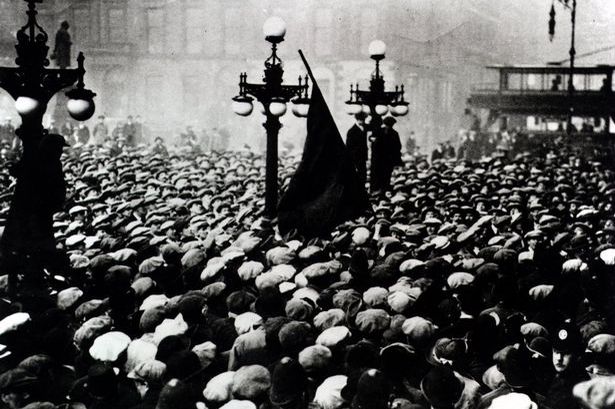Today Friday 31 January 2019, marks the centenary of the Battle of George Square, one of the most significant moments in Scottish working class and trade union history. The Battle of George Square, otherwise known as “Bloody Friday” started with a strike called by the Clyde Worker’s Committee (CWC). CWC and their members sought to agitate for the 40 hour week. The industrial action was well supported on Clydeside, and by 31 January 1919, estimates of 90,000 striking workers and their families flooded to Glasgow’s George Square. The Red Flag was raised in the crowd. The British state, concerned that such well supported agitation would turn to a Bolshevik style revolution, violently suppressed the rising, sending tanks, soldiers and machine guns to Glasgow. Over 50 people were injured as a consequence.
 The years leading up to the Battle of George Square saw unrest in the city and surrounding areas. Mary Barbour’s Rent Strikes, anti-war agitation and discontent in the shipyards paved the way for the Battle of George Square and, ultimately, led to significant changes in the law.
The years leading up to the Battle of George Square saw unrest in the city and surrounding areas. Mary Barbour’s Rent Strikes, anti-war agitation and discontent in the shipyards paved the way for the Battle of George Square and, ultimately, led to significant changes in the law.
One hundred years after the Battle of George Square, we would do well to remember the famous words of John MacLean, one of the significant leaders of Red Clydeside; “I wish no harm to any human being, but I, as one man, am going to exercise my freedom of speech. No human being on the face of the earth, no government is going to take from me my right to speak, my right to protest against wrong, my right to do everything that is for the benefit of mankind. I am not here, then, as the accused; I am here as the accuser of capitalism dripping with blood from head to foot.”
We cannot under estimate the importance of class power and trade unionism in this era, or now, in the twenty first century, despite the state’s attempts to fracture the movement since the 1970s. The trade union led workers’ fight for a decent quality of living continues. Only last year the TUC called for a four day working week to be seriously considered. In an era of 24 hour communication, email and smartphones workers are expected to be available to provide their labour far in excess of the normal working week. The mental health impact of shift work requiring employees to work anti-social hours is now being well documented. We have seen the rise of the precariat, a class of worker who despite being employed cannot rely on that income to provide for themselves and their families. Only a collective, strategic, trade union led movement can counteract the forces of globalism and capitalism which seek to exploit workers’ labour at the expense of workers’ lives.


